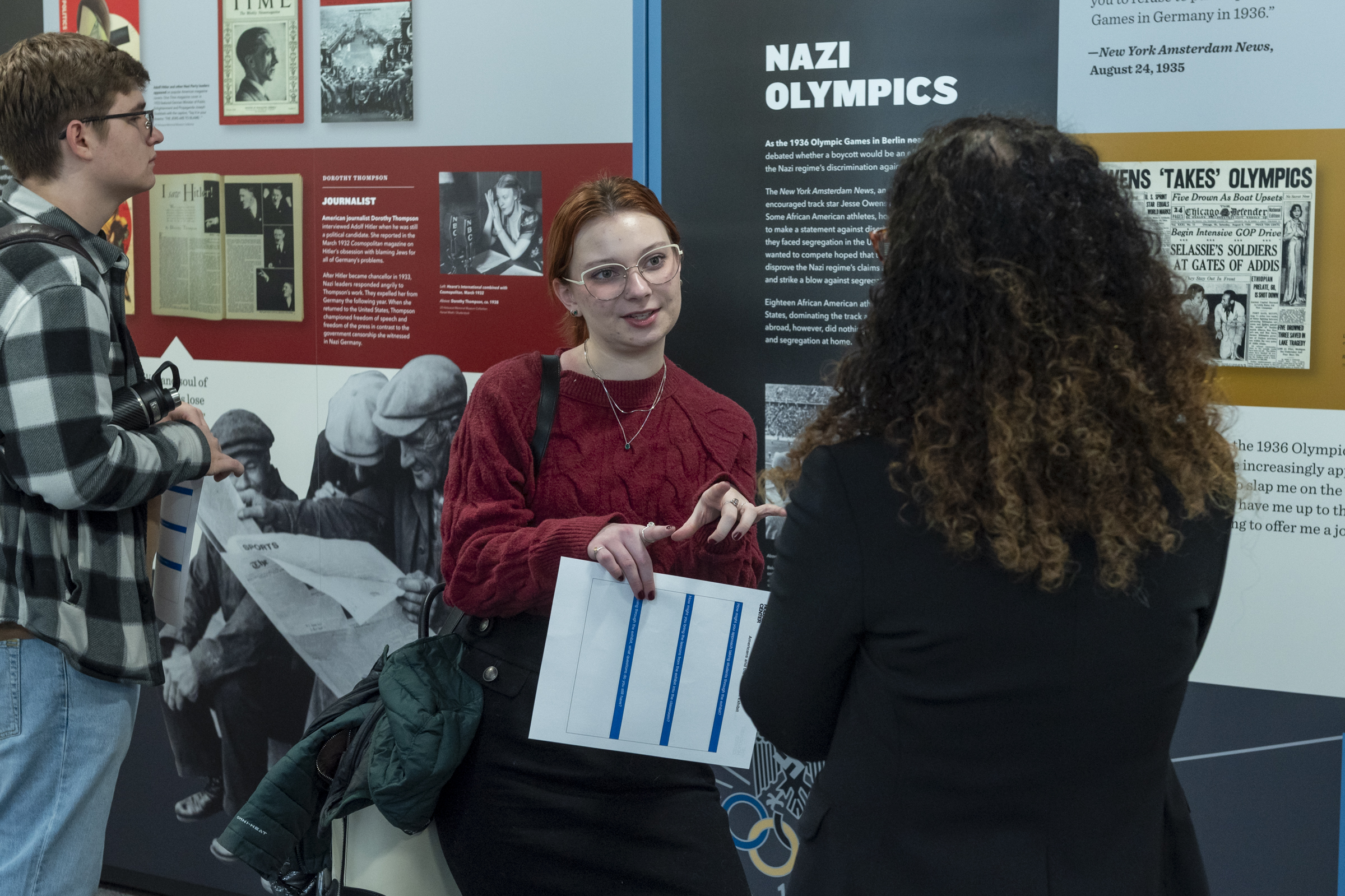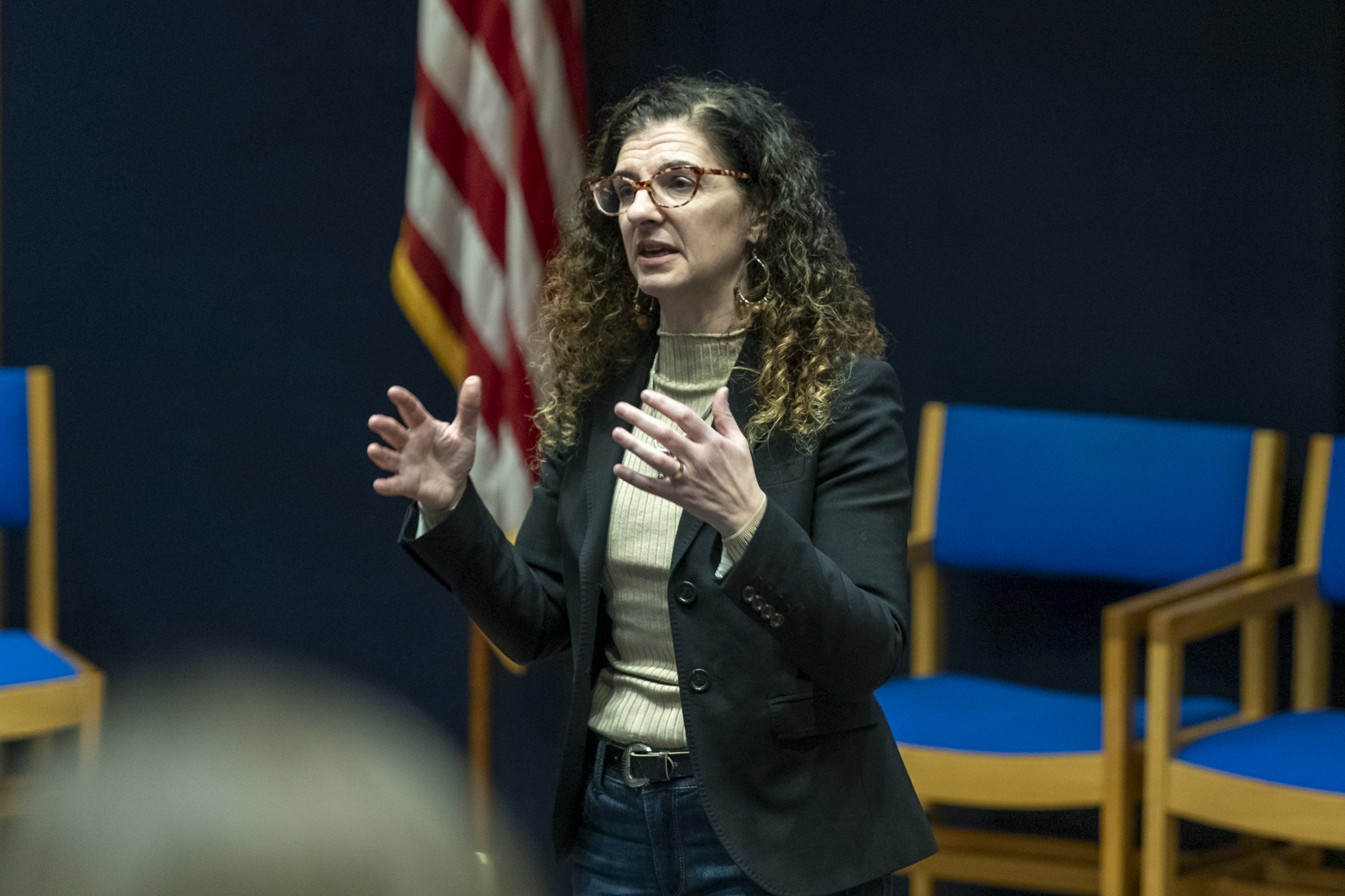MSU Serling Institute for Jewish Studies, History department partner to bring traveling exhibit, “Americans and the Holocaust” from the United States Holocaust Memorial Museum to Library of Michigan in Lansing
January 23, 2025 - Emily Jodway

MSU History Professor Kristen Fermaglich speaks with former student Avery Daugherty at the "Americans and the Holocaust" exhibit at the Library of Michigan. Fermaglich was part of a workshop for students from the College of Social Science and the College.
The Michael and Elaine Serling Institute for Jewish Studies and Modern Israel at Michigan State University and the MSU Department of History are partnering this month with the Library of Michigan, the Zekelman Holocaust Center, and the Raoul Wallenberg Institute at the University of Michigan to bring an important exhibition on the United States and the Holocaust to mid-Michigan.
The Library of Michigan, located in downtown Lansing, was one of 50 U.S. libraries selected to host Americans and the Holocaust, a traveling exhibition from the U.S. Holocaust Memorial Museum (USHMM) and the American Library Association (ALA) that examines the motives, pressures and fears that shaped Americans’ responses to Nazism, war and genocide in Europe during the 1930s and 1940s.
The History department will also be co-sponsoring a series of events to accompany the exhibit, including a panel on the history of antisemitism in Michigan and a session with students from the College of Education on incorporating Holocaust history lessons into classroom curricula.
Dr. Kirsten Fermaglich [pictured below], a professor of history and Jewish Studies, spoke about the opportunity this exhibit presents to educate the public on this pivotal moment in history. She had heard about the call for applications to host the traveling exhibit and knew that it would be a great opportunity and a very well-done exhibit, having known Dr. Daniel Greene, museum curator at the National Holocaust Museum, for several years.
“I just think it’s a really important subject that we don’t usually think about,” she added. “We usually are just looking at the Holocaust, not thinking about its impact on Americans, the experiences of European Jews who were able to survive and come to the United States, and the ways in which the United States did or did not help people during this violent time.”
Fermaglich also noted the benefit of this exhibit being centrally located right here in the state’s capital. Typically an exhibit of this sort would reside in a large metropolitan area such as Boston or Los Angeles, but it was important to the USHMM that this series be available in areas where audiences don’t always have easy access to visiting a large-scale museum.
 “This exhibit was really designed to be reaching audiences that don’t have a lot of access to Holocaust education and aren’t used to thinking about the impact of the Holocaust on them and their own lives,” she said. “It enables us to reach so many people that we wouldn’t ordinarily reach, being in downtown Lansing. There are so many different groups that utilize this library, so many school groups, so the chance to bring them in will be great. We’ll also be having buses available to take students here on campus over to the exhibit.”
“This exhibit was really designed to be reaching audiences that don’t have a lot of access to Holocaust education and aren’t used to thinking about the impact of the Holocaust on them and their own lives,” she said. “It enables us to reach so many people that we wouldn’t ordinarily reach, being in downtown Lansing. There are so many different groups that utilize this library, so many school groups, so the chance to bring them in will be great. We’ll also be having buses available to take students here on campus over to the exhibit.”
The exhibit features many heartrending stories and visual companion pieces from the exhibit in Washington, including propaganda posters from World War II, letters, correspondences and identity documents. Also included are several graphs showing the variances in polling of US public opinion from during this time, interactive graphics that show the journey overseas many refugees endured, and a combination of actual newsreel footage and pop culture renditions from movies and newsreels all about this period of our history.
The History Department is also providing aid for the exhibit through an undergraduate research assistant, who will assist in building a companion exhibit titled “Americans and the Holocaust: a Michigan perspective” at the Broad Museum next semester. Students in the classes of Fermaglich and Dr. Amy Simon will be working together to create this exhibit as well. They plan to do their own research via materials provided by local families, studies of historical newspapers and archives, and working with artifacts provided by the Zekelman Holocaust Center in Farmington Hills.
“Students will get to learn about this history but also about museums and the way that they work, their staff and their roles as educators and collectors,” Fermaglich said. “I’m going to be learning too; I’ve never done real museum work and I think it has an opportunity to encourage students to think differently about history … about audiences, about storytelling, about artifacts and what they can reveal.”
The exhibit also coincides with January 27 being Holocaust Remembrance Day, marking the anniversary of the liberation of Auschwitz-Birkenau and commemorating the many individuals whose lives were impacted by the Nazi reign of terror. Despite this dark period of history taking place nearly 80 years ago, it can still spark reflection on our current societal issues surrounding racism and discrimination.
“It’s very much looking at the past, but it’s also encouraging people to think about themselves and the contemporary moment as well,” Fermaglich said. “It’s important to understand the ways that the government can work together with civil society to create conditions, slowly, that dehumanize people. I think it’s really important to show this exhibit with the hope that people will think carefully and thoughtfully about voting, about government, about their position as citizens and neighbors and human beings in our world.”
Americans and the Holocaust will be on display at the Library of Michigan, Lake Erie Room, along with a series of related special events, from January 11 to February 22, 2025. For more information, visit https://events.cal.msu.edu/events/americans-and-the-holocaust-exhibition-and-special-events/.

